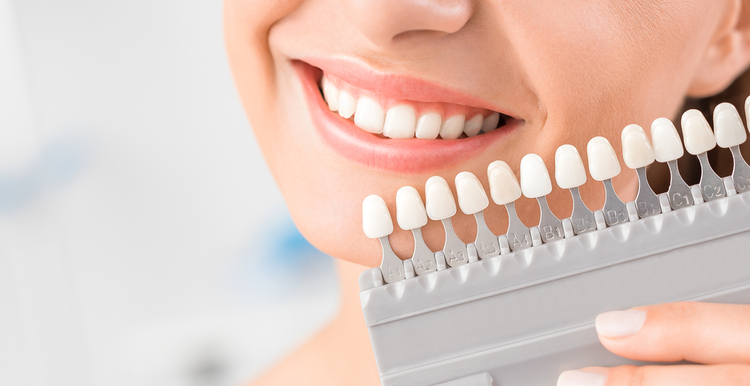Teeth whitening – Things you need to know
Give it a thought: Isn’t it true that your smile is the first thing on your face to be noticed by other people? A joyful lady with perfectly white teeth will easily leave a good impression on others. Needless to say, yellow stained teeth are what shakes your confidence. As a result, all you have to offer a few closed-lip smiles instead of a happy, bright grin.
Want to fix this problem? Absolutely. So, what is the right treatment option for you? The answer is teeth whitening. Before you receive this seemingly simple treatment, it’s important to have a thorough understanding first.
Why are your teeth yellow?
There are many reasons why the color of your teeth changes over time. If you are a smoker, coffee addict, or a huge consumer of soda and dark-colored drinks, your teeth are likely to have stains. In addition, the failure to practice good oral hygiene by brushing and flossing also causes the plaque on teeth to become hardened and hard to remove.
These are not all! Even when you follow a healthy diet and avoid foods and liquids in dark colors to prevent tooth discoloration, your teeth will turn into a naturally yellow shade anyway as you age. In fact, the true color of your teeth is not white but pale yellow. Therefore, if a person has shiny white teeth, you can be sure they’ve received teeth whitening treatment.
Do-it-yourself teeth whitening
There are many ways to whiten your teeth without the help from your dentist.
Use teeth-whitening toothpastes
Almost all teeth-whitening toothpastes contain either hydrogen peroxide or carbamide peroxide. Their working mechanisms are quite similar: they gently penetrate the tooth surface – also known as the enamel – to sweep stains away, returning the original color to your teeth.
Use teeth-whitening products
There are hundreds of teeth-whitening products on the market:
- Whitening strips: transparent strips with ingredients that are safe for your enamel. These work to remove the plaque and yellow stains that have long been on your teeth.
- Whitening pens: Whitening pens are usually recommended by many dentists for easy, quick, and remarkable effects. The silicon head can easily penetrate the enamel and deliver whitening gel to the tooth surface. Your teeth will achieve the desired color after a few uses.
- Whitening activated charcoal powder. Charcoal helps remove the plaque on teeth as well as increase the pH levels in your mouth, which prevents tooth decay. So, if you want to whiten your teeth, you should not miss out on this product. Charcoal power is used as a kind of toothpaste. Dip a wet toothbrush into the power and brush your teeth gently. Brush your teeth once again with a toothpaste and you are good to go.
- Tooth polisher. This is a tool kit used to remove plaque and give your teeth a shiny look. One advantage of this product is its small size – you can bring it with you during your business or vacation trip
- Whitening gel. Brushing with a small (bean-sized) amount of this gel added to your toothpaste will help clean up the yellow stains and keep your gums healthy.
- Whitening mouthwash. When used in combination with other whitening products, a whitening mouthwash will help whiten your teeth, give your breath fresh, pleasant smell as well as prevent yellow stains from forming.
Teeth-whitening natural remedies
Don’t be so quick to skip all the natural teeth-whitening remedies as they can bring you significant outcomes. People usually pass along teeth-whitening remedies such as using coconut oil, baking soda, salt, lemons, banana peels, rice water, and so on. If you use these methods on a daily basis, you will achieve perfectly white teeth and a fresh, pleasant breath without having to pay for dental crowns.
Professional teeth whitening
If all the home remedies have failed to help, you can consult with the dentist about professional teeth-whitening techniques. Your dentist will use a “whitener” to remove the yellow and dark brown stains on your teeth. Your teeth will look 3 to 5 times brighter after only 1 hour. This treatment is considered quicker and more effective than at-home remedies (taking a few weeks or more)
Nonetheless, before you make the decision to get professional teeth whitening, keep in mind the following:
1. Safety
Teeth-whitening products are made from hydrogen peroxide or carbamide peroxide. They are extremely safe and won’t destroy the enamel if used in the right dose. That means you should not go overboard as it may harm your teeth and make them look unnatural.
However, the nature of this whitening process is using oxidation to free the oxides, splitting protein chains to erase the discoloration shown when exposed to sunlight. Therefore, if the whitener comes in contact with the gums, the areas surrounding the tooth roots will be affected.
2. Your teeth can only be whitened up a few shades
If you have yellow teeth due to smoking or alcohol and expect teeth whitening treatment to bring your perfectly white smile back, you will be disappointed soon. Teeth whitening results can vary depending on individual factors, typically achieving a 1-2 shade improvement. The final outcome is influenced by the natural enamel and the extent of discoloration, which mean not everyone will see dramatic results..

3. Non-permanent results
Your teeth becoming white and shiny again doesn’t mean they will remain white and shiny for the rest of your life. Whether they will stay white or not depends upon how you take care of your teeth after the procedure. If you continue to smoke, drink coffee, etc., the stains will come back, requiring new treatment methods in the future.
4. The procedure only works for real teeth
If you have dental crowns or porcelain teeth, don’t expect to have them whitened to go with your original. This will result in uneven teeth color. The only way to improve this is to have your dentist replace your porcelain tooth with another after 2 weeks following teeth whitening (when the original color of your teeth have returned).
5. Teeth whitening increases sensitivity
When your teeth are affected, for whatever purpose it is, they will become more sensitive than normal. All kinds of teeth whitening are the same – they all increase tooth sensitivity. However, this problem is only temporary. As long as you strictly follow your dentist’s advice, your teeth will return to its original state soon.
6. A painless procedure
Most patients feel no pain during teeth whitening. A few people experience sensitive teeth after the procedure. This problem typically goes away after 1 to 2 days. If there is too much discomfort, you may opt for low-dose pain killers.
If the sensitivity persists for longer than usual (for 4 days or more), chances are you have an undetected oral condition. Visit your doctor right away to seek timely treatment.
7. Don’t overuse it
Like how you shouldn’t overuse cosmetic surgery, overusing teeth whitening should never be encouraged. Although it is tempting to have nice, shiny teeth, whitening them too many times can result in permanent damages to your teeth. These include weakened enamel, opaque teeth or extremely severe discoloration that is beyond repair.
What to do before teeth whitening
- Understand why your teeth have turned yellow. If it is due to your eating and drinking habits, there is no need to visit your dentist yet. Try using teeth-whitening products (as mentioned above) at home instead. If this problem is a result of compromised health, genetic factors, or discoloration from the inside of your teeth, consider getting help from your dentist
- Remove all tartar, brush colored stains off your teeth, get dental fillings to restore tooth roots, and treat tooth sensitivity.
Teeth whitening aftercare
- Avoid drinking water for at least 3 hours after the procedure.
- Refrain from dark-colored foods and drinks such as sauces, coffee, tea, and alcohol as well as fruits with segments like oranges, lemons, and mandarin oranges for 2 weeks following teeth whitening.
- Avoid drinking too hot or cold liquids to prevent tooth sensitivity.
- Take up good hygiene practices to prevent your teeth from getting discolored again.
- Keep the remaining trays and whitener. Use the whitener once or twice each year to keep your teeth shiny.
Who shouldn’t get teeth whitening?
- Patients allergic to teeth whitener (any on-going treatment must be stopped)
- Pregnant or breastfeeding women
- Children 18 years old (due to the risk of marrow irritation)
People with dental conditions such as gingivitis, gum recession, mechanical tooth abrasion that reveals the dentin.
For dental checkup & consultation with dentist at The East Rose Dental
- Click here to book an appointment online directly : https://eastrosedental.com/en/contact.html
- SMS, Viber, Zalo, Whats App, Skype: +84 90 8 321 455
- Hotline: (+84)908 321 455 - (+84)931 857 885
The East Rose Dental – Since 2000 – Top 2nd - All On 4 Vietnam
➮ Clinic District 2: 166 Dong Van Cong, Thanh My Loi Ward, District 2, Ho Chi Minh City (adjacent to Vista Verde apartment).
➮ Clinic District 1: 30-36, 2nd floor Phan Boi Chau, Ben Thanh Ward, District 1, Ho Chi Minh City (at the East Gate of Ben Thanh Market).
Services
Working Time
- Monday - Friday: 08:00 - 19:00
- Saturday: 08:00 - 18:00
- Sunday closed
Contact Info
- Hotline 1: (+84) 908 321 455
- Hotline 2: (+84) 931 857 885
- Mobile: (+84) 8 3925 8778
- Phone: (+84)2 838 258 778
- info@dentalrose.net
- rosedentalclinicvn@gmail.com
 English
English  Tiếng Việt
Tiếng Việt

